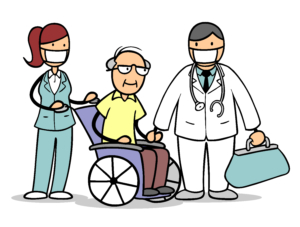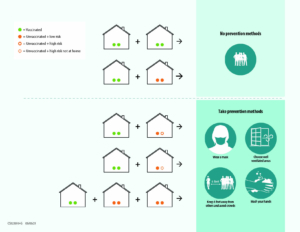Mobile Physician Services Blog
Read our latest news and updates here. If you have any specific questions, try our FAQs page.
Department of Elder Affairs Launches “We Will Meet You at Home” Campaign to Assist Homebound Seniors
/in News blog /by Jimmy HiltonTALLAHASSEE, Fla. – The Florida Department of Elder Affairs’ (DOEA) ‘We Will Meet You at Home’ campaign is designed to ensure every older adult who wants a shot receives a shot. This initiative builds upon other programs launched throughout the state to provide homebound seniors access to COVID-19 vaccinations. While many of Florida’s older residents have received a COVID-19 vaccination, not every senior is able to leave their home. In these cases, the Florida Department of Elder Affairs and the state’s 11 Area Agencies on Aging (AAAs) are offering seniors access to transportation to go and receive a vaccine. Elders also have the option of having a health care worker bring the vaccine to their front door.
“From the very beginning, Governor DeSantis focused Florida’s vaccination efforts on protecting seniors,” said DOEA Secretary Richard Prudom. “This targeted initiative is an important push to make sure Florida’s homebound individuals have the same opportunity for a vaccination as mobile residents. We’re doing everything possible to ensure every homebound senior has access to a vaccination.”
DOEA’s statewide initiative is distributing over 175,000 informational flyers to older homebound adults requesting more information about vaccines or vaccine access. AAAs made tens of thousands of outbound wellness calls over a 2-month period to identify people requesting more resources. In addition to print, the We Will Meet You at Home campaign employs radio and television spots in English, Spanish, and Haitian Creole. You may listen and see all the spots here: https://elderaffairs.org/newsroom/well-meet-you-at-home-campaign/
The Department’s Area Agencies on Aging connect seniors with community providers to get a ride to a doctor’s office, a pharmacy, a grocery store, or another vaccination site. The local AAAs may also assist in arranging a health care professional to come to the individual’s house to receive a vaccination. If you or someone you know would like assistance with transportation in getting to a COVID-19 vaccination appointment or would like a health provider to bring a shot to your front door, then the Department’s AAAs are here to help. Call 1-800-96 ELDER or email homeboundvaccine@em.myflorida.com.
# # #
About the Florida Department of Elder Affairs
The Florida Department of Elder Affairs, the State Unit on Aging, helps Florida’s elders to remain healthy, safe, and independent. For more information, please visit www.elderaffairs.org.
Ticks
/in News blog /by Jimmy HiltonSkin Cancer
/in News blog /by Jimmy HiltonInterim Public Health Recommendations for Fully Vaccinated People
/in News blog /by Jimmy HiltonSource CDC, Updated Mar. 8, 2021
This is the first set of public health recommendations for fully vaccinated people. This guidance will be updated and expanded based on the level of community spread of SARS-CoV-2, the proportion of the population that is fully vaccinated, and the rapidly evolving science on COVID-19 vaccines.
For the purposes of this guidance, people are considered fully vaccinated for COVID-19 ≥2 weeks after they have received the second dose in a 2-dose series (Pfizer-BioNTech or Moderna), or ≥2 weeks after they have received a single-dose vaccine (Johnson and Johnson [J&J]/Janssen ).†
The following recommendations apply to non-healthcare settings.
Fully vaccinated people can:
- Visit with other fully vaccinated people indoors without wearing masks or physical distancing
- Visit with unvaccinated people from a single household who are at low risk for severe COVID-19 disease indoors without wearing masks or physical distancing
- Refrain from quarantine and testing following a known exposure if asymptomatic
For now, fully vaccinated people should continue to:
- Take precautions in public like wearing a well-fitted mask and physical distancing
- Wear masks, practice physical distancing, and adhere to other prevention measures when visiting with unvaccinated people who are at increased risk for severe
- COVID-19 disease or who have an unvaccinated household member who is at increased risk for severe COVID-19 disease
- Wear masks, maintain physical distance, and practice other prevention measures when visiting with unvaccinated people from multiple households
- Avoid medium- and large-sized in-person gatherings
- Get tested if experiencing COVID-19 symptoms
- Follow guidance issued by individual employers
- Follow CDC and health department travel requirements and recommendations
For more information visit the Centers For Disease Control and Prevention
Coronary Artery Disease (CAD)
/in News blog /by Olaniyi OkeHeart Disease is a chronic condition that is one of the leading causes of death in the United States. Heart Disease describes the different types of heart conditions. Heart conditions that are often associated with Heart Disease are Arrhythmia, Atherosclerosis (hardening of the arteries), Cardiomyopathy, Congenital heart defects, Coronary artery disease (CAD), and Endocarditis (Heart infection). Coronary artery disease is the most common type of Heart Disease in the United States, about 18.2 million adults aged 20 and older have CAD[1]
Plaque build-up along the walls of our arteries can cause coronary artery disease. Cholesterol and other material within our arteries make up these plaques. As the plaques continue to deposit in the lining of our artery walls, that build-up can cause our arteries to narrow over time to where blood flow within the artery is either partially blocked or completely blocked. In a healthy artery wall, the cells are smooth and elastic, which allows for blood to flow with no issues. Chest pain and discomfort are two typical signs and symptoms of CAD. For most people, a heart attack is often the first clue that they may have CAD. Those symptoms are chest pain, shortness of breath, pain or discomfort in the arm or shoulder, and light-headedness. Over time, CAD can weaken the heart muscles to the point where the heart cannot pump blood properly, thus causing heart failure[2]. There are many diagnostic tests that a physician can use to diagnose the onset of CAD. A few standard tests are an electrocardiogram (ECG), Echocardiogram, and Cardiac CT scan.
There are many risk factors associated with CAD. Age, sex, family history, smoking, blood pressure, cholesterol levels, weight, activity levels, and stress are all essential factors that play a role in the onset of CAD. Family history is one risk factor to pay close attention to. A familial history of heart disease is often associated with a higher risk of CAD. If your brother or father is diagnosed with heart disease before the age of 55 or if your mother or sister is diagnosed with heart disease before the age of 65, you’re at an increased risk[3]. Blood pressure and cholesterol also play an essential role in the onset of CAD. Individuals with uncontrolled high blood pressure can result in the hardening of their arteries. High cholesterol not controlled can result in the formation of plaques along the walls of our arteries, causing Atherosclerosis. With uncontrolled high blood pressure and cholesterol, they can lead to blocked arteries and a heart attack’s common signs. Obesity, lack of physical activity, and high-stress levels are also associated with the onset of CAD. Risk factors for CAD often occur together and may trigger other underlying risk factors.
When treating and preventing CAD, there are many different factors to take into account. Lifestyle changes such as quitting smoking, maintaining a healthy weight, and lowering your blood pressure, cholesterol, and blood sugar are critical steps to prevent CAD. Regular physical exercise and a diet rich in fresh fruits and vegetables with very few processed foods help prevent CAD. Limiting both your sodium and sugar intake can help lower both your blood pressure and blood sugar[4]. Medications such as Aspirin and Beta-blockers help treat and maintain CAD. Aspirin is a blood thinner that can help reduce blood clots’ frequency, potentially helping prevent the obstruction of your coronary artery. Beta-blockers help slows down our heart rate and decreases our blood pressure, reducing our heart’s demand for oxygen[5]. Maintaining a healthy diet, moderate physical activity, and taking medication can help prevent or treat CAD.
[1] Heart disease facts. (2020, September 08). Retrieved February 04, 2021, from https://www.cdc.gov/heartdisease/facts.htm
[2] Coronary artery disease. (2019, December 09). Retrieved February 04, 2021, from https://www.cdc.gov/heartdisease/coronary_ad.htm
[3] Coronary artery disease. (2020, June 05). Retrieved February 08, 2021, from https://www.mayoclinic.org/diseases-conditions/coronary-artery-disease/symptoms-causes/syc-20350613
[4] Prevent heart disease. (2020, April 21). Retrieved February 16, 2021, from https://www.cdc.gov/heartdisease/prevention.htm
[5] Coronary artery disease. (2020, June 05). Retrieved February 16, 2021, from https://www.mayoclinic.org/diseases-conditions/coronary-artery-disease/diagnosis-treatment/drc-20350619







